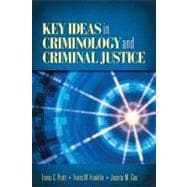
Note: Supplemental materials are not guaranteed with Rental or Used book purchases.
Purchase Benefits
What is included with this book?
| Introduction | |
| Key Idea: Rational Offending and Rational Punishment | |
| The Social Context of Criminal Punishment | |
| Beccaria's Proposal | |
| Why it Caught On | |
| Influence: The Rise of the Classical School of Criminology | |
| Empirical Analyses and Critiques of Free Will, Rationality, and Deterrence | |
| Key Idea: The Science of Criminal Behavior | |
| The Social Context: A Time Without Criminology | |
| The Road to Lombroso | |
| Lombroso and the Body of the Criminal | |
| The Dissemination of Lombroso's Theories | |
| Criticisms of Lombroso's Theories | |
| Lombroso's Influence | |
| Key Idea: Understanding Crime and Society | |
| The Social Context of the Early Twentieth Century | |
| Social Disorganization and Anomie/Strain Theories | |
| Rejecting Individualism | |
| The Legacy of Anomie/Strain and Social Disorganization Theories | |
| Key Idea: Hirschi's Social Bond/Social Control Theory | |
| The Social Context of the 1960s | |
| Social Bond/Social Control Theory | |
| The Marketing of Social Bond/Social Control Theory | |
| The Legacy of Social Bond/Social Control Theory | |
| Key Idea: Rehabilitation is Dead | |
| The Martinson Report | |
| Social Context | |
| Getting the Word Out | |
| The Influence of the Martinson Report | |
| Key Idea: Crime Control Through Selective Incapacitation | |
| The Context: Criminology, Criminal Justice Policy, and Society in the 1970s | |
| James Q. Wilson's Thinking About Crime | |
| Why it Caught on | |
| Selective Incapacitation's Effect on Criminal Justice and Criminology: Empirical Tests, Empirical Critiques, and Ethical Dilemmas | |
| Key Idea: The Police Can Control Crime | |
| The Context of Criminology and Policing | |
| Broken Windows Theory: Revamping the Police Role | |
| How Broken Windows Theory Reached its Audience | |
| The Influence of Broken Windows Theory | |
| Empirical Tests and Critiques of Broken Windows Theory and Policing | |
| Key Idea: The War on Drugs | |
| Winning the War is Easy | |
| The 1980s in Context | |
| The Magic in "Just Say No" | |
| The Impact of "Just Say No" | |
| Key Idea: Rehabilitation-Not Dead Yet | |
| The Principles of Risk, Need, and Responsivity | |
| Social Context | |
| Disseminating the Principles of Effective Rehabilitation | |
| The Impact of Meta-Analysis and the Principles of Effective Rehabilitation | |
| Key Idea: Crime and the Life Course | |
| The Criminological Context of the Early 1990s | |
| Life Course Theories in Criminology | |
| Constructing Testable Theories | |
| Life Course Theory Catches On | |
| Looking Back, Looking Forward: Conclusions | |
| Looking Back: The Glaring Omissions? | |
| The Legitimate Contenders | |
| Looking Forward: The Future of Criminology and Criminal Justice | |
| Table of Contents provided by Ingram. All Rights Reserved. |
The New copy of this book will include any supplemental materials advertised. Please check the title of the book to determine if it should include any access cards, study guides, lab manuals, CDs, etc.
The Used, Rental and eBook copies of this book are not guaranteed to include any supplemental materials. Typically, only the book itself is included. This is true even if the title states it includes any access cards, study guides, lab manuals, CDs, etc.